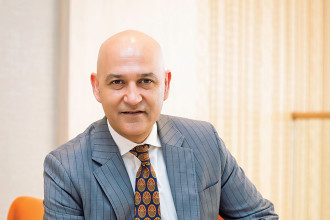
Prarthana Saakha
Co-founder and Chief Business Development Officer, BIC Technology
Executive Board Member, Nepal Association for Software and IT Companies (NAS-IT)
President, NYEF Kathmandu Chapter
Starting out as a student entrepreneur, Prarthana Saakha has always been a proponent of innovation and technology. Her career started as a Microsoft student partner at Microsoft Innovation Centre which is a worldwide programme to sponsor students majoring in disciplines related to technology.
Careerwise, Saakha has over six years of experience in the automotive industry and over two years in software business development. She was a national consultant in the United Nations OCHA, co-founded Helmets Nepal which was the country’s first one-stop solution for helmets and bike accessories, and now is the Chief BDO of Tigg which is a cloud-based accounting solution for SMEs in Nepal to help them manage their finances, taxes and generate business metrics in an easy-to-understand format. Starting as a member of NYEF, Saakha currently also serves as the President of NYEF, Kathmandu Chapter. She is also board member at NAS-IT and a partner in BIC Technology.
Saakha has an interest in advocating for women and youth rights. She was also a cohort member of EmpowHER 2017, a programme initiated by Ujyalo Foundation that aims to create self-reliant women leaders who can showcase independence, resilience and competence in today’s world and can be role models for other women in their communities.
In this issue of Business 360, we spoke to Saakha about the growth of Nepali entrepreneurship, the challenges of legacy and first-generation entrepreneurs, women in entrepreneurship, and the role of NYEF in building Nepal as an entrepreneurial hub.
How has NYEF contributed to the growth and development of young entrepreneurs in Nepal?
For the growth and development of young entrepreneurs in Nepal, we primarily focus on business and entrepreneurship. We can see that brain drain is burgeoning in Nepal as youths are eagerly seeking opportunities abroad. The possible reasons for this could be lack of satisfactory pay and job satisfaction. And when they see their friends or opportunities abroad then they start developing the fear of missing out. Considering this scenario, I believe that entrepreneurship will encourage youths to stay in Nepal. When they start their own business then they will have this sense of freedom and recognition.
NYEF is an organisation that encourages youths who have a zeal to start something and provides a platform for mentorship. For businesses that have already been set up, we incorporate them in our community and help them in networking for their business. We also help them to scale up. Overall, our aim is to encourage entrepreneurship especially for youths to help minimise brain drain, which has become a major problem in the country.
What types of businesses are young entrepreneurs getting into these days?
Analysing the trend in Nepal, youths are more focused on technology. We can see many startups which are technology related. Through this we can see a possibility of building Nepal as a tech hub. We can also see youths in manufacturing and trading and some even take over their family business. Additionally, the gifting culture is also witnessing a rise. Small handicraft items are in trend and people even run this as a business.
Since you became the President of NYEF, what changes have you introduced within the organisation?
At NYEF, it is not about taking on responsibilities only after being the president. There is a layer where we have the positions of first vice president, second vice president and then only can we become the president. So, when I was in those positions, I was more focused on youth and women and was strongly advocating for it as I also have a Master’s degree in Gender Studies.
NYEF is a good platform for networking but I felt a lot more could be done. I searched for something which could add value to the contribution made by youths and we ended up introducing the NYEF Startup Awards. We also recognise women entrepreneurs on Women’s Day and create a platform for networking too. I introduced speed mentoring for youths as well where college going students are invited and introduced to established entrepreneurs.
Do you have a specific agenda that you are taking forward?
My agenda is essentially focused on three things. Firstly, I aim to enable youths, directly or indirectly, encouraging them to stay back in the country. Secondly, beyond entrepreneurship, I aim to enable women leadership, often referred to as intrapreneurship. Often while giving trainings, I request companies to send their women employees to take the training. Lastly, I envision to plan and execute works which will benefit the company of the entrepreneurs associated with us. Well, we are still working on the third agenda.
What are the key challenges that young entrepreneurs face in the country?
Amongst the myriad of challenges, I view education as one of the major challenges. Education has become very expensive. When people invest such a heavy amount in education, I wonder when they will receive the return. Moreover, if one is investing Rs 50,000 to Rs one lakh monthly in educating their first child, they will be hesitant to afford a second child. So, education is changing people’s mindset but whether in a positive or negative light remains questionable. I am quite not aware of the situation outside the valley. But in the valley, we can witness that people studying in a business school believe that they will get their returns by going abroad.
Another challenge that I have seen is people feel a lack of freedom while living with the family. Especially for women, as they have this societal pressure of getting married. For instance, if a single woman wants to start a venture, people will not invest. In such a situation, going abroad seems to be the best solution. Hence, rather than risking opening a venture, women feel better shifting abroad.
The government policies are also formulated in such a way that it actually encourages brain drain.
Challenges are similar between those who have legacy businesses and first-generation entrepreneurs. Currently, we are all facing a manpower shortage. We have started Chiya-guff (TEA-TALK) where we discuss the problems faced by startups. And here the common problem that we all talk about is the human resources issue. The other challenge is in obtaining loans to start or scale up a business.
How is NYEF addressing problems faced by entrepreneurs?
Currently, we are in the research phase. We are analysing and observing the problems in the inter-sector like B-to-B (business to business). Earlier, it was more of a networking place, but now impactful works are coming soon. The e-commerce bill came. We, who are so tied to the e-commerce bill, weren’t involved while the bill was being drafted. So, after the bill was introduced, we raised some points and initiated discussions. Yet, all points that we raised have not been taken into account. A startup policy was also introduced but the startups were not involved in its formulation.
How do you see women’s foray into tech businesses?
Actually, there are very few women who have founded technology businesses. We had conducted a small survey in colleges teaching technology and we noticed that the ratio of female students is actually more. However, when they come to the field, they only have a certain expertise, mainly only what they study. But when it comes to male students they tend to network, find the right people and start a company. We noticed that females are more inclined towards jobs. Even in NAS-IT there are just two of us females. All in all, there are very few female tech founders.
How does NYEF foster collaboration and networking among young entrepreneurs in Nepal?
We believe that we have to value members. So, every other month we conduct ‘socials’ which provides a platform for networking. Through this, members can informally build networks either to start a business or expand an existing one. We have a wide network here, which can be used to encourage students and youths to stay in Nepal and help advocate at the policy level as well.
How do you view the startup policy of the nation? What has been done right and what needs to change?
In Nepal, we can see that innovation is coming prior to the policy. Even in the case of Pathao and Tootle, it was the same issue. It’s the same for freelancers as well. I think when drafting any policy, the concerned people or those working on the ground should be involved. Once, there was this policy discussion for startups but the policy discussion drifted from the main direction. It was like we were speaking but our voices were not really being heard. Previously, we even used to meet concerned ministers but our voices were not being heard and we stopped the visits. Maybe if the government was a bit more responsible.
What is the entrepreneur mindset? What are three qualities you believe are essential for a business person to succeed?
It is all about the way one thinks. Entrepreneurs not only think about trading or business but also about innovation. If you bring a problem, how do they perceive it and how differently do they think about solving it matters more. Talking about the qualities, I think the first is persistence. The entrepreneurial journey is challenging and oftentimes the leader is alone at the top. Then the next skill would be the ability to build networks and develop communication skills. Initially, the team will help but after that to grow, networking is necessary. Thirdly, an entrepreneur should know a bit of everything. They should be updated and aware about everything. Knowledge about everything is needed.
What have you learnt from being part of NYEF?
NYEF has brought about a lot of changes in me. After I opened my first business, Helmets Nepal, covid 19 happened. It was during this time that I realized that I contemplated going abroad. But when I got involved with NYEF, I saw people who had started from nothing and achieved a lot. Such examples inspired me a lot. I was encouraged to start again. I learnt communication and networking. It also helped me to grow professionally. Overall, NYEF has played a big role in my life.
As the President of NYEF, what advice would you give to aspiring young entrepreneurs in Nepal?
If people are going abroad, I wouldn’t stop them. I would rather say go abroad, learn but return to the country. I recommend them to join various platforms like NYEF for mentorship and network building. They can be members and interact and gain insights. All in all, youths can definitely do something in Nepal itself.
Does FNCCI provide NYEF a mentorship role?
Actually, there has been nothing of that sort till now. However, FNCCI has been passing down some youth related opportunities. And even in the upcoming investment summit, they have given us some space but we need more. We look forward to having more of their support.



-1744694423.jpg)

-1738128188.jpg)
